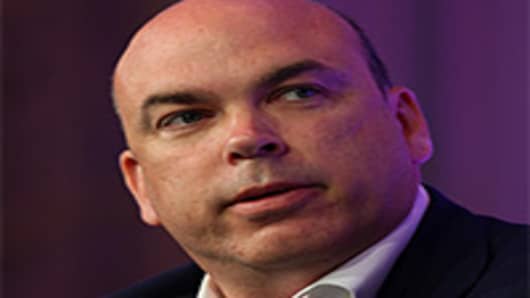Mike Lynch, the founder of Autonomy who is engaged in a war of words with Hewlett-Packard hief Executive Meg Whitman over allegations of fraud, is firmly at the heart of the British establishment and was once dubbed the "British Bill Gates" by the media.
He sits on the board of lofty state broadcaster the BBC, advises Prime Minister David Cameron on science and technology and there was even talk of a knighthood for him in 2013's New Year Honours List.
The Honours List is traditionally used by the government to reward titans of business, entertainment, philanthropy and the civil service. Lynch has already been awarded an Order of the British Empire for services to enterprise. He also sits on the boards of private equity giant Apax and the British Library, and recently set up his own venture capital firm Invoke.
Born in Ireland, Lynch built up Autonomy from Cambridge, where he studied natural sciences at Christ's College, traditionally the most academically-focused of the Cambridge colleges. He had previously set up Lynett Systems nd Cambridge Neurodynamics fter undertaking both a PhD and post-doctoral studies related to software.
But it was Autonomy which propelled the 47-year old into the FTSE 100 index and earned him a 500 million pound ($796 million) payout when it sold to HP last year. U.K. politicians and the business community frequently bemoan the lack of home-grown success stories in sectors like technology and science over the past decade, and complain about bright science graduates going into financial services or moving across the Atlantic. Autonomy was one standout success to focus on.
Yet there were naysayers even at the height of its success selling its key technology, which uses a statistical theory called Bayes' theorem to make sense of huge amounts of unstructured data.
(Read More: Red Flags Raised on Autonomy)
Analysts in London raised questions over its cash conversion, its organic growth rate and whether it was categorizing hardware sales as software sales. However, as Lynch pointed out in light of HP's allegations, some of the biggest names in auditing were involved in checking its numbers. Deloitte was Autonomy's auditor and KPMG examined the company's books for HP before the acquisition. Both didn't find any of the alleged "improprieties" Whitman has accused the company of. There were also plenty of analysts with "Buy" ratings on Autonomy.
(Read More: Meg Whitman on 'Accounting Improprieties' at Autonomy)
Red flags were also raised when Lynch left the company in May, despite statements at the time of the acquisition that he would stay on for at least two years.
After the HP news broke on Tuesday, Lynch told CNBC he felt "pretty ambushed" by the allegations and said "I think there's been significant mismanagement of the company."
(Read more: Mike Lynch Talks to CNBC)


